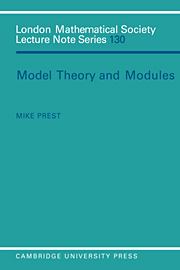Book contents
- Frontmatter
- Contents
- Introduction
- Acknowledgements
- Notations and conventions
- Remarks on the development of the area
- Section summaries
- Chapter 1 Some preliminaries
- Chapter 2 Positive primitive formulas and the sets they define
- Chapter 3 Stability and totally transcendental modules
- Chapter 4 Hulls
- Chapter 5 Forking and ranks
- Chapter 6 Stability-theoretic properties of types
- Chapter 7 Superstable modules
- Chapter 8 The lattice of pp-types and free realisations of pp-types
- Chapter 9 Types and the structure of pure-injective modules
- Chapter 10 Dimension and decomposition
- Chapter 11 Modules over artinian rings
- Chapter 12 Functor categories
- Chapter 13 Modules over Artin algebras
- Chapter 14 Projective and flat modules
- Chapter 15 Torsion and torsionfree classes
- Chapter 16 Elimination of quantifiers
- Chapter 17 Decidability and undecidability
- Problems page
- Bibliography
- Examples index
- Notation index
- Index
Chapter 16 - Elimination of quantifiers
Published online by Cambridge University Press: 15 December 2009
- Frontmatter
- Contents
- Introduction
- Acknowledgements
- Notations and conventions
- Remarks on the development of the area
- Section summaries
- Chapter 1 Some preliminaries
- Chapter 2 Positive primitive formulas and the sets they define
- Chapter 3 Stability and totally transcendental modules
- Chapter 4 Hulls
- Chapter 5 Forking and ranks
- Chapter 6 Stability-theoretic properties of types
- Chapter 7 Superstable modules
- Chapter 8 The lattice of pp-types and free realisations of pp-types
- Chapter 9 Types and the structure of pure-injective modules
- Chapter 10 Dimension and decomposition
- Chapter 11 Modules over artinian rings
- Chapter 12 Functor categories
- Chapter 13 Modules over Artin algebras
- Chapter 14 Projective and flat modules
- Chapter 15 Torsion and torsionfree classes
- Chapter 16 Elimination of quantifiers
- Chapter 17 Decidability and undecidability
- Problems page
- Bibliography
- Examples index
- Notation index
- Index
Summary
A complete theory of modules has (complete) elimination of quantifiers if every definable subset of a model may be defined without the use of quantifiers. Thus, in a module with elimination of quantifiers, the (pp-)type of every element is determined by its annihilator – so our study comes close to being “purely algebraic”.
A good deal of initial work in the model theory of modules was done in a context where one has elimination of quantifiers, and that comparatively “algebraic” case has proved to be quite a reliable guide as to what to expect when we do have to take account of quantifiers. The first section begins by delineating some of the consequences of elimination of quantifiers. One soon discovers that elimination of quantifiers is just a little weaker than one would like: so we introduce and work with the stronger condition (denoted elim-Q+) that every pp formula is actually a conjunction of atomic formulas (elimination of quantifiers guarantees only that it is a boolean combination of atomic formulas). In any theory with elim-Q+ the indecomposable pureinjectives are “small” in the sense that they are uniform (any two non-zero submodules intersect non-trivially).
A ring is regular iff all of its modules have complete elimination of quantifiers. That is proved in the second section, and the consequences are pursued. The usual spectrum of algebraic finiteness conditions is much shortened for regular rings: we see that the same goes for our model-theoretic finiteness conditions. All our work on regular rings is aided by the fact that there is a simple canonical form for the invariants of §2.4.
- Type
- Chapter
- Information
- Model Theory and Modules , pp. 317 - 331Publisher: Cambridge University PressPrint publication year: 1988



